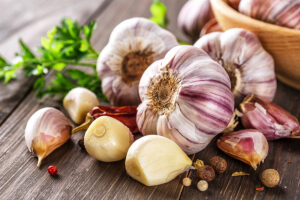A randomized study on 70 women patients found that garlic was effective against rheumatoid arthritis. The researchers accepted 62 of the women into the study. Half of the patients received 1000 mg of a garlic extract (the equivalent of 2.5 grams of fresh garlic). To clarify, the study group received the garlic extract daily for 8 weeks; the other half received a placebo. Researchers measured pain scores, inflammation, tender joint counts and fatigue in the beginning and the end of the trial. The serum levels of the C-reactive protein were significantly reduced at the end of the trial. Tumor necrosis factor alpha and erythrocyte sedimentation rate were also significantly reduced in the garlic group compared to placebo. Disease activity scores and a fatigue score were also reduced in the garlic group. All of this documented that garlic appears to be anti-inflammatory in comparison to the placebo group.
Garlic’s known healing chemicals
The chemicals contained in garlic were examined by many labs around the world. Here are some of the more important effects of garlic.
- It is possible to postpone hardening of the arteries can by taking garlic powder supplement (Allicor, INAT-Farma) twice daily for 24 months.
- Consuming garlic daily for 3 months lowered pre-meal blood sugars and thus prevented diabetes.
- LDL cholesterol levels reduce when a person consumes garlic for at least 8 weeks.
- Garlic consumption can lower high blood pressure. Specifically, it lowers systolic blood pressure by 7-9 mm mercury and diastolic blood pressure by 4-6 mm mercury.
More effects of garlic
- Various forms of fungal skin infections respond to a gel containing ajoene, a chemical in garlic that is antifungal. People with ringworm (Tinea corporis) respond to 0.6% ajoene gel twice per day for 1 week. This was as efficient as an antifungal cream. Jock itch (Tinea cruris) responded to gel containing 0.6% ajoene twice per day for 1 week. And athlete’s foot (Tinea pedis) responded to a gel containing 1% ajoene with the same efficiency as the antifungal Lamisil.
- Several studies regarding prostate cancer showed that taking one clove of garlic per day lowered the risk of developing prostate cancer by 50%. However, a similar study in Iran failed to show prostate protective effects of garlic.
Pain with knee osteoarthritis improved
- Osteoarthritis patients responded to garlic treatment. The anti-inflammatory effects of garlic are useful for the control of pain and swelling with arthritis. In this clinical trial 76 subjects completed the study. They were 50 to 75 years old overweight to obese women with mild to moderate osteoarthritis of the knees. The patients received 500 mg of garlic tablets twice per day for 12 weeks. The placebo group receive placebo pills instead. There were 39 women in the garlic group and 37 in the placebo group. There was a significant reduction of resistin levels in blood. Pain scores also showed a significant reduction in the garlic group, but not the placebo group. Tumor necrosis factor showed no difference between the start of the garlic trial and the end of the trial. The researchers concluded that resistin is the mediator for osteoarthritis pain. Garlic has a significant pain-relieving effect on patients with osteoarthritis in the knees.
Various clinical studies regarding the effect of garlic
This review article cites many papers where various clinical conditions were treated with garlic and garlic extracts.
Conclusion
A randomized placebo study of 62 women with rheumatoid arthritis of the knee showed a clear anti-inflammatory action of the experimental group, not the placebo. The sedimentation rate and the C-reactive protein were both lower. Tumor necrosis factor alpha showed reduced values at the end of the 8-week study. There was also a reduction of the disease activity scores and a fatigue score. The rheumatoid arthritis patients in the placebo group showed no changes. The researchers set up the study properly, but the number of the subjects was on the low side. Also, the study period of 8 weeks was somewhat short. Further studies with larger numbers and a longer observation period are desirable. In the meantime, it is certainly more beneficial to take garlic as a supplement than to ignore the benefits.







